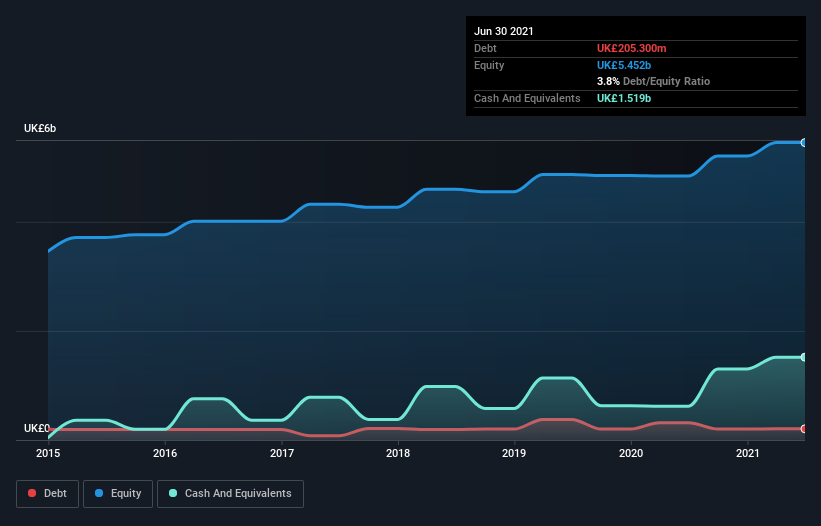Is Barratt Developments (LON:BDEV) Using Too Much Debt?
Howard Marks put it nicely when he said that, rather than worrying about share price volatility, 'The possibility of permanent loss is the risk I worry about... and every practical investor I know worries about.' It's only natural to consider a company's balance sheet when you examine how risky it is, since debt is often involved when a business collapses. As with many other companies Barratt Developments plc (LON:BDEV) makes use of debt. But the more important question is: how much risk is that debt creating?
When Is Debt Dangerous?
Debt is a tool to help businesses grow, but if a business is incapable of paying off its lenders, then it exists at their mercy. Part and parcel of capitalism is the process of 'creative destruction' where failed businesses are mercilessly liquidated by their bankers. However, a more common (but still painful) scenario is that it has to raise new equity capital at a low price, thus permanently diluting shareholders. Of course, plenty of companies use debt to fund growth, without any negative consequences. The first thing to do when considering how much debt a business uses is to look at its cash and debt together.
View our latest analysis for Barratt Developments
How Much Debt Does Barratt Developments Carry?
You can click the graphic below for the historical numbers, but it shows that Barratt Developments had UK£205.3m of debt in June 2021, down from UK£317.7m, one year before. But it also has UK£1.52b in cash to offset that, meaning it has UK£1.31b net cash.
How Strong Is Barratt Developments' Balance Sheet?
We can see from the most recent balance sheet that Barratt Developments had liabilities of UK£1.49b falling due within a year, and liabilities of UK£535.5m due beyond that. Offsetting this, it had UK£1.52b in cash and UK£165.2m in receivables that were due within 12 months. So its liabilities outweigh the sum of its cash and (near-term) receivables by UK£337.7m.
Given Barratt Developments has a market capitalization of UK£6.56b, it's hard to believe these liabilities pose much threat. Having said that, it's clear that we should continue to monitor its balance sheet, lest it change for the worse. While it does have liabilities worth noting, Barratt Developments also has more cash than debt, so we're pretty confident it can manage its debt safely.
On top of that, Barratt Developments grew its EBIT by 60% over the last twelve months, and that growth will make it easier to handle its debt. When analysing debt levels, the balance sheet is the obvious place to start. But ultimately the future profitability of the business will decide if Barratt Developments can strengthen its balance sheet over time. So if you want to see what the professionals think, you might find this free report on analyst profit forecasts to be interesting.
But our final consideration is also important, because a company cannot pay debt with paper profits; it needs cold hard cash. While Barratt Developments has net cash on its balance sheet, it's still worth taking a look at its ability to convert earnings before interest and tax (EBIT) to free cash flow, to help us understand how quickly it is building (or eroding) that cash balance. Over the most recent three years, Barratt Developments recorded free cash flow worth 54% of its EBIT, which is around normal, given free cash flow excludes interest and tax. This cold hard cash means it can reduce its debt when it wants to.
Summing up
We could understand if investors are concerned about Barratt Developments's liabilities, but we can be reassured by the fact it has has net cash of UK£1.31b. And it impressed us with its EBIT growth of 60% over the last year. So we don't think Barratt Developments's use of debt is risky. The balance sheet is clearly the area to focus on when you are analysing debt. But ultimately, every company can contain risks that exist outside of the balance sheet. To that end, you should be aware of the 1 warning sign we've spotted with Barratt Developments .
Of course, if you're the type of investor who prefers buying stocks without the burden of debt, then don't hesitate to discover our exclusive list of net cash growth stocks, today.
This article by Simply Wall St is general in nature. We provide commentary based on historical data and analyst forecasts only using an unbiased methodology and our articles are not intended to be financial advice. It does not constitute a recommendation to buy or sell any stock, and does not take account of your objectives, or your financial situation. We aim to bring you long-term focused analysis driven by fundamental data. Note that our analysis may not factor in the latest price-sensitive company announcements or qualitative material. Simply Wall St has no position in any stocks mentioned.
Have feedback on this article? Concerned about the content? Get in touch with us directly. Alternatively, email editorial-team (at) simplywallst.com.


